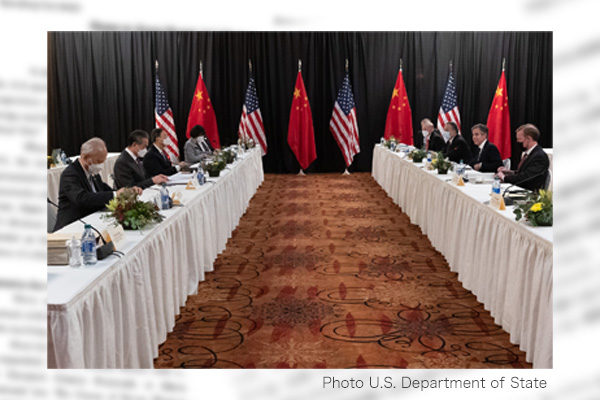Talks between top U.S. and Chinese foreign policy officials in Anchorage, Alaska, were significant in that the Chinese side boiled over and gave away their true feelings while their American counterparts remained cool. The Chinese officials asserted as if Chinese “democracy” gains more support than American democracy that is allegedly shared only by some of the countries in the world. Such assertion indicates that it would not be easy for the United States and China to reconcile. But remarks by the Chinese officials offer a glimpse into their wish for continuing talks with the U.S.
Yang’s remarks aiming at domestic audience
Emotional parts of remarks in the talks must be discarded. As indicated by an online Quad summit between top leaders of the U.S., Japan, Australia and India, U.S. Secretary of State Antony Blinken’s and Secretary of Defense Lloyd Austin’s visits to Japan and South Korea, and Washington’s announcement of new sanctions on China over Hong Kong in the run-up to the Anchorage meeting, Washington has preceded Beijing in launching a diplomatic offensive.
Why did the Chinese delegation have to travel to the U.S. state of Alaska for the talks? In his opening remarks at the talks, Secretary Blinken unceremoniously spelled out Chinese problems over Xinjiang Uighur, Hong Kong, Taiwan, cyberattacks and coercive economic policies against U.S. allies. This angered Chinese Communist Party Politburo member Yang Jiechi and Foreign Minister Wang Yi at the talks, as indicated by the transcript of the meeting.
In a remark indicating China’s real intention, Yang insisted that China would not accept “so-called ‘rules-based’ international order” advocated by “a small number of countries.” He said China and the international community uphold “the United Nations-centered international system and the international order underpinned by international law.” The remark came in a manner to counter Blinken’s statement that vowed to strengthen the rules-based international order. Yang asserted that China has the Chinese-style democracy.
Yang also criticized American democracy. Many people in the U.S. actually have little confidence in American democracy and various views regarding the U.S. government, while the leaders of China enjoy wide support of the Chinese people, he said.
The Yang remarks were interpreted by many American media as aiming at earning points in China rather than a rebuttal to Blinken. This interpretation may be right. I doubt if China really upholds the United Nations-centered international system supported by international law.
Climate change is the next focus of attention
Anyway, the Biden administration’s basic stance on China as of now represents an extension of the Trump policy and the administration takes advantage of enhanced U.S. alliances for exerting pressure on China. While having failed to pre-empt U.S. diplomatic offensive, China could not hide its willingness to continue talks with the U.S.
Yang said, “We need to enhance communication, properly manage our differences and expand our cooperation instead of engaging in confrontation,” recalling many achievements China and the U.S. accomplished in the past. At the end of his opening remarks, Wang said China hopes to increase mutual understanding based on mutual respect if the U.S. is interested in doing so. China’s Global Times has suggested China and the U.S. could make rules to resolve the cyber and other issues, while noting that the declining America has taken a high-handed attitude to conceal its weakness.
The two countries have not clashed over the climate change issue. How would the Biden administration deal with China’s expected clever diplomacy? U.S.-China talks will enter the second phase soon.
Tadae Takubo is Vice President of Japan Institute for National Fundamentals and a professor emeritus at Kyorin University.


